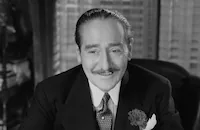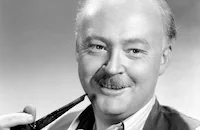Golden Boy

Brief Synopsis
Cast & Crew
Rouben Mamoulian
Barbara Stanwyck
Adolphe Menjou
William Holden
Lee J. Cobb
Joseph Calleia
Film Details
Technical Specs

Synopsis
Joe Bonaparte was born to be a violinist, but feeling suddenly that life is fleeting and that his practice is getting him nowhere, he decides to take up boxing. His father, the owner of a modest grocery store, is proud of his son's musical gift and spends his savings to buy Joe a fine violin. On the night that he is to present it to his son, Joe enters the fight ring, wins one hundred dollars, and decides that fighting is his game. Turning his back on his father's dreams, Joe hooks up with fight manager Tom Moody and makes a rapid rise. As the novelty of boxing wears off, however, he finds his inner conscience dictating his return to the violin. Moody's sweetheart, Lorna Moon, works on the boy to continue fighting for fame and money, but when the pair fall in love, Lorna comes to understand Joe's love for music and tries to persuade him to give up fighting. When racketeering gangster Eddie Fuseli moves in to assume Joe's contract for betting manipulations, Lorna becomes disillusioned and agrees to marry Tom. Joe's indecision finally ends when he kills an opponent in the ring, and tortured by his conscience, he discards his gloves and returns home to his father, his violin and Lorna.

Director

Rouben Mamoulian
Cast

Barbara Stanwyck

Adolphe Menjou

William Holden

Lee J. Cobb

Joseph Calleia

Sam Levene

Edward S. Brophy
Beatrice Blinn
William H. Strauss

Don Beddoe

John Wray
Frank Jenks
James Cannonball Green

Charles Lane
Harry Tyler
Stanley Andrews

Robert Sterling
Clinton Rosemond
Alex Melesh
Minerva Urecal
Eddie Fetherston

Lee Phelps
Sam Hayes
Alfred Grant
Onest Conley
Syd Saylor
Dora Clement
Landers Stevens
John Harmon
George Lloyd
Anne Kay
Al Lang
Pat Mckee
Mickey Golden
Joe Gray
Gordon Armitage
John Kern
Al Bayne
Thomas Garland
Cy Schindell
Bob Ryan
Ian Mcewing
Charles Randolph
Larry Mcgrath
Charles Sullivan
Roy Moore
Eddie Coke
Dave Willock
Don Brodie
Charles Sherlock
Crew
Eugene Anderson
Lionel Banks
Karl Freund
Victor Heerman
Kalloch
Rouben Mamoulian
Sarah Y. Mason
Lewis Meltzer
Otto Meyer
Nick Musuraca
William Perlberg
D. W. Starling
M. W. Stoloff
Daniel Taradash
Victor Young

Videos
Movie Clip



Film Details
Technical Specs

Award Nominations
Best Music Original Dramatic Score
Best Score
Articles
Golden Boy (1939)
Golden Boy (1939) is an adaptation of the hit 1937 play by famed playwright Clifford Odets (1906-1963). Odets, who founded the Group Theater in New York, was known for his impassioned explorations of social issues, particularly the impact of materialism on individual aspirations and ideals. Odets had an ambivalent relationship with Hollywood throughout his career and refused to collaborate on the screenplay adaptation; not only were entire characters cut in the process, but the grim original ending--a double suicide--was reworked to make the story more palatable to filmgoing audiences. Harry Cohn at Columbia Pictures purchased the rights to the play in 1938 for a hefty $100,000 with Frank Capra envisioned as the director and Jean Arthur in the key role of Lorna Moon. Capra continued to loom in the background though Rouben Mamoulian, an accomplished stage director whose resume included the 1927 production of Porgy and Bess, was eventually selected for the project; for not only did Capra fight to get the project for himself, Barbara Stanwyck biographer Axel Masden reports that Cohn even told screenwriters Lewis Meltzer and Daniel Taradash to "make it sound like Capra," much to Mamoulian's consternation.
John Garfield, who played the role of the taxi driver on stage and later played the lead, was initially considered for the much-coveted role of Joe but Columbia was unable to get him loaned out from Warner Brothers; other actors considered included Richard Carlson and Tyrone Power. When Alan Ladd, at that time an unknown, tried out for the part, he died his hair black using cakes of mascara in order to make himself look more "Italian." He recalls: "It was one of the hottest days of the year. While reading the test scene I began to feel a dripping down the back of my neck. I was taking a shower in black ink. Thanks to Mamoulian's tact, he pretended not to notice. Sue and I laugh to this day because, after our frantic efforts to be a true Italian type, another blond actor landed the role--William Holden."
William Holden won the leading role of Joe Bonaparte only by chance. Under contract at Paramount, at this point he had played only bit parts in now-forgotten films such as Prison Farm (1938) and Million Dollar Legs (1939). Mamoulian, who was studying Paramount's screen tests of Margaret Young, a possible candidate for the role of Joe's sister, was struck by the young man playing opposite her in the tests. At Mamoulian's insistence Harry Cohn hired Holden, buying out half of his meager contract of $50 per week. Only 21 at the time, Holden was insecure about his abilities and even missed work on the first week of shooting due to "nerves." Barbara Stanwyck, who was by now a seasoned professional, having established herself in films such as the legendary melodrama Stella Dallas (1937), provided Holden with crucial emotional support and defended him to Cohn, who was considering firing him. As a result of their close collaboration Stanwyck and Holden developed a special affection for their roles and for each other, although they collaborated on only one more film: Executive Suite (1954). When the two appeared on stage together at the 1978 Academy Awards, Stanwyck referred to Holden as "my golden boy," a sentiment which she echoed in 1982 when accepting her honorary Oscar: "A few years ago I stood on this stage with William Holden as a presenter. I loved him very much and I miss him. He always wished that I would get an Oscar. And so tonight, my golden boy, you got your wish."
Although not a major box office success, Golden Boy was moderately well-received by the critics; Variety singled out Barbara Stanwyck for praise, saying that "[h]er performance does much to provide a sincere ring to the picture." Frank S. Nugent of The New York Times admired Mamoulian's direction of the film's now-famous fight scene (shot on location in Madison Square Garden), describing it as a "savagely eloquent piece of cinematic social comment." Some contemporary critics, most notably Tom Milne, have argued that Mamoulian's film, with its energetic cast, sharp dialogue (especially compared to the sentimental excesses of Odets' play) and strong sense of visual style, actually holds up better today than the play. Golden Boy received one Academy Award nomination for Victor Young's score.
Director: Rouben Mamoulian
Producer: William Perlberg
Screenplay: Lewis Meltzer, Daniel Taradash, Sarah Y. Mason and Victor Heerman; based on the play by Clifford Odets.
Cinematography: Nick Musuraca and Karl Freund
Editing: Otto Meyer
Music: Victor Young
Art Direction: Lionel Banks
Principal Cast: Barbara Stanwyck (Lorna Moon); Adolphe Menjou (Tom Moody); William Holden (Joe Bonaparte); Joseph Calleia (Eddie Fuseli); Sam Levene (Siggie), Edward S. Brophy (Roxy Lewis).
BW-100m.
by James Steffen

Golden Boy (1939)
Quotes
This your girl?- Eddie Fuseli
I'm my mother's girl.- Lorna Moon
Trivia
The play originally opened in New York on 4 November 1937 and had 250 performances. Luther Adler played Joe Bonaparte, Francis Farmer played Lorna Moon, and Roman Bohnen played Tom Moody. Lee J. Cobb was also in the play as Mr. Carp.
Notes
According to news items in Hollywood Reporter, Columbia bought the rights to the play in 1938 for $100,000 as a starring vehicle for Jean Arthur, who was to be directed by Frank Capra. John Garfield (who portrayed Joe Bonaparte in the play), Elia Kazan, Richard Carlson and Tyrone Power were all considered for the role of Bonaparte, but Fox refused to loan-out Power and Carlson's commitment to Stars in Your Eyes, a Broadway show, prevented him from taking the role. A New York Times article notes that director Rouben Mamoulian was so impressed by William Holden's screen test that he arranged for Columbia to buy 50 percent of his contract from Paramount. This picture marked Holden's first starring role and launched his film career. Another news item in Hollywood Reporter adds that the film was shot on location at Madison Square Garden. The film was nominated for an Academy Award for Best Original Score. Modern sources credit George Cooper as sound recorder, Leo Shuken with orchestrations, Abe Roth as technical advisor and Hollis Donahue as Barbara Stanwyck's hairdresser.

Miscellaneous Notes
Released in United States 1939
Released in United States 1939













